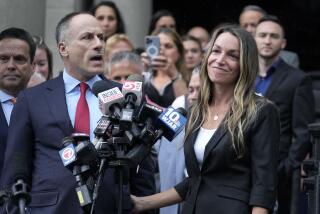Mistrial Declared in Penalty Phase of McKinzie Trial
- Share via
With the jury hopelessly deadlocked, Superior Court Judge Vincent J. O’Neill Jr. was forced to declare a mistrial Monday in the death penalty phase of Kenneth McKinzie’s murder trial.
The decision came after five days of heated deliberations in which 11 jurors tried to persuade one holdout that McKinzie, 39, should be executed for beating and strangling an elderly Oxnard woman during a 1995 robbery. But the lone juror refused to budge, despite deliberations that some jurors said dissolved into angry shouting matches and finger-pointing.
Within hours of the mistrial being declared, prosecutors announced that they would seek a second penalty trial against McKinzie next spring, given the brutal circumstances of 73-year-old Ruth Avril’s murder.
“This wasn’t a shot to the head,” said Deputy Dist. Atty. Donald Glynn. “This was an ongoing period of brutality.”
Avril was attacked after midnight on Dec. 22, 1995, while turning off a light in her garage. She was repeatedly beaten in the head, then forced into the trunk of her own car. The killer drove to a remote agricultural area of Oxnard where he strangled her and tossed her body into an irrigation ditch.
During Monday’s court proceeding, defense attorney Willard Wiksell urged prosecutors not to make a quick decision on whether to retry the penalty phase. Outside the courtroom, he told reporters he thought such a move would be unprecedented in Ventura County.
“I don’t think there’s ever been a penalty phase that’s been retried, and I don’t see any reason to start with this one,” he said, noting that prosecutors abandoned such efforts when the jury deadlocked in the penalty phase of convicted killer Michael Dally’s trial earlier this year.
Wiksell said his client faces a minimum sentence of life in prison without the possibility of parole if prosecutors do not seek a retrial, and suggested that “there are other things to spend hundreds of thousands of dollars on other than trying to kill a man who is going to die in jail.”
During the monthlong guilt portion of the trial, Wiksell argued that authorities had charged the wrong man. He identified the killer as Donald Thomas, a former Oxnard resident whose handprint was found inside Avril’s apartment.
Wiksell said his client bought stolen property from Thomas that linked him to the crime. But the jury rejected that defense, finding McKinzie guilty of first-degree murder and related charges on Nov. 3.
Walking away from the courthouse Monday, McKinzie’s parents echoed his lawyer’s sentiments about an appropriate penalty in the case, though still declaring their son’s innocence.
“My son didn’t do it,” said Betty McKinzie, the defendant’s mother.
“Don’t give him death,” added father Kenneth McKinzie Sr. “There is no reason for that.”
Prosecutors decided last year that they would seek the death penalty against the defendant because of the brutality of the crimes. After meeting with Dist. Atty. Michael D. Bradbury on Monday afternoon, Glynn said the office does not intend to change its position.
After being excused from the case Monday, most jurors were reluctant to talk about their deliberations, darting away to parked cars and saying only that it had been a long, difficult process.
But a few talked briefly outside the courthouse about the process, which they said became increasingly contentious as one male juror refused to consider the death penalty.
Most jurors believed McKinzie, a career criminal with a history of violence against women, deserved execution because of the brutal circumstances of the crime, they said.
Jurors said they couldn’t get crime scene photos of Avril’s beaten and strangled body out of their minds. Some said they would never forget them.
For many, the fact that McKinzie went back to Avril’s south Oxnard apartment after killing her to steal her belongings--including gifts from under her Christmas tree and credit cards that he used to obtain drug money--convinced them that life in prison without parole was too lenient.
But the holdout juror disagreed. Jurors said he remained tight-lipped about why, adding to their frustration.
At times, they said, jurors pointed fingers in his face and shouted to emphasize their point. But he remained calm and replied, “I’m not going to change my mind,” jurors said.
Outside the courthouse, the holdout juror declined to comment on his position, saying only: “I just want to put the whole thing behind me. It’s been a difficult week.”
The group began deliberations last Tuesday. By Thursday, jurors announced they were hung 11 votes to 1 without indicating which way the majority was leaning.
Rather than declare a mistrial after 2 1/2 days of deliberations, O’Neill ordered the jury to continue its discussions in hopes of reaching a unanimous verdict.
“This is not an attempt by me to coerce anyone to change their vote,” the judge said. “I know you’ve been working hard.” But by Friday afternoon, nothing had changed.
The holdout refused to join the majority despite what jurors described as a “superhuman” effort to reach agreement.
Nevertheless, the judge told jurors to consider the matter further over the weekend and instructed the panel to return Monday to take one last vote. They did. It remained 11 to 1.
One juror, who declined to give his name, said the holdout juror believed McKinzie had “repented” for his crime.
“From all the testimony, that wasn’t true,” the man said. “[McKinzie] continued on with his same lifestyle.”
Before each day’s deliberations began, jurors said, the foreman led the group in prayer. They said they prayed for McKinzie.
“We wanted God to guide us in our deliberations,” one juror said. “We were hoping he would help us find a way to shake the other juror into understanding.”
Times staff writer Tina Dirmann contributed to this story.
More to Read
Sign up for Essential California
The most important California stories and recommendations in your inbox every morning.
You may occasionally receive promotional content from the Los Angeles Times.












